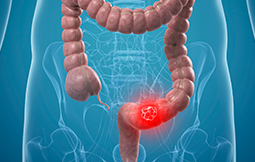
Colon cancer also called colorectal cancer happens when cancer cells attack the colon or the rectum in a person’s body. Colon Cancer is a serious disease not to be taken lightly and one should take precautions. Colon Cancer like other Cancer has different stages.
Colon cancer also called colorectal cancer happens when cancer cells attack the colon or the rectum in a person’s body. Colon Cancer is a serious disease not to be taken lightly and one should take precautions. Colon Cancer like other Cancer has different stages. Colon cancer usually affects older adults; however, it can happen at any age. It typically begins as small, noncancerous (benign) clumps of cells called polyps that form on the inside of the colon. Over time several of these polyps can develop colon cancers.
may often no signs in the early stage of the colon cancer but symptoms may develop as the cancer advances. These may include pain in the rectal and pelvis and abdomen regions, bowel obstruction, change in food and bowel habits, constipation, blood in the urine or stool, diarrhea, gas, anemia, extreme weight loss, loss of appetite, lumps in the abdomen, and fatigue. If one has any of these symptoms of colon cancer, it is advisable to visit a doctor and get proper medical attention.
During a colonoscopy, a colonoscope (lighted, flexible tube) is injected into the rectum, looking at the entire colon for any abnormalities. Biopsies may be acted during a colonoscopy. During a sigmoidoscopy, a sigmoidoscope (lighted, flexible tube) is injected into the rectum and the minor portion of the colon (sigmoid colon) to look for any abnormalities. A double-contrast barium enema is also known as a lower GI series, this test uses the liquid enema contrast barium, to evaluate under X-ray changes in the inferior gastrointestinal tract which includes the colon and the rectum.
Depending on how wide the colectomy is, If the only portion of the colon is detached, it’s called a hemicolectomy, partial colectomy, or segmental resection. The healthy portion of the organ is either reconnected to the rectum or otherwise attached to the wall of the abdomen. In such a case, the procedure is called a colostomy, and one has to use a colostomy bag for defecation.
To remove smaller cancers which are more localized doctors prefer using endoscopy. If the cancer is too advanced or if it is untreatable palliative surgery is performed to relieve any blockages in the colon and stop the pain and bleeding. At last, if the cancer is improved Palliative surgery is performed which assists to ease any blockage of the colon and manage pain, bleeding, and other symptoms. This relieves symptoms in cases of untreatable or advanced cancers.
Copyright © 2025 IMA | All Rights Reserved.